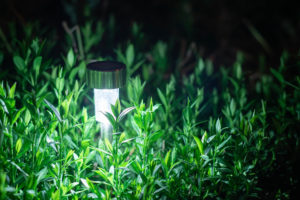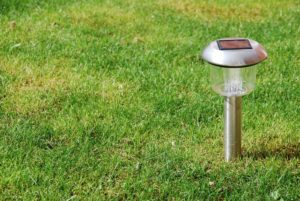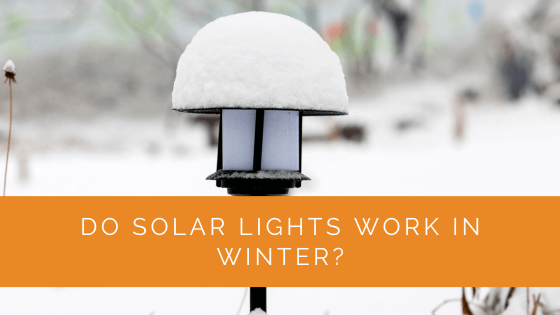As the days grow shorter and the temperature drops, many homeowners with outdoor solar lighting systems begin to wonder: do solar lights work in winter? Solar lights are a fantastic way to illuminate your outdoor space while saving on energy costs, but their effectiveness during the colder months is a common concern. In this article, we will delve into the intricacies of solar lights, how they work, and whether they can withstand winter’s challenges.
Contents
- 1 Key Takeaways
- 2 How Solar Lights Work
- 3 Factors Affecting Solar Lights in Winter
- 4 Do Solar Lights Work in the Winter Months?
- 5 Tips to Make Solar Lights Work Efficiently in Winter
- 6 Fully Charge Your Solar Lights
- 7 Case Study: Optimizing Solar Lights for Winter Performance
- 8 Expert Insights From Our Solar Panel Installers About Solar Lights in Winter
- 9 Our Expertise in Solar Lights
- 10 Conclusion
Key Takeaways
- Solar lights can work in winter, but their performance may be affected by reduced daylight hours, the angle of sunlight, and weather conditions.
- Maximizing direct sunlight exposure, keeping solar panels clean, maintaining batteries, and considering upgrading to advanced solar lighting systems are essential to ensure optimal performance during the winter months.
- Fully charging the batteries and, if necessary, charging them indoors can help compensate for reduced sunlight, allowing solar lights to continue providing illumination during the winter.
How Solar Lights Work
Solar Panel Technology
Solar lights operate on the principle of converting sunlight into electrical energy. This conversion begins with the solar panel, the heart of the system. Solar panels have numerous photovoltaic cells that capture sunlight and convert it into direct current (DC) electricity. This electricity is then stored in rechargeable batteries for later use. These photovoltaic cells are meticulously designed to absorb as much sunlight as possible, transforming it into a renewable energy source that powers your outdoor lighting system.
Battery Storage
The rechargeable batteries in solar lighting systems play a critical role in ensuring the lights continue functioning, even when the sun is not shining. These batteries store the energy generated by the solar panel during daylight hours and provide power to the LED lights during the night. The size and quality of these batteries determine how long your solar lights can operate without direct sunlight. The advancements in battery technology have made modern solar lights more efficient and capable of storing energy for extended periods.
LED Lights
Most modern solar lights use highly efficient LED (Light Emitting Diode) bulbs. LEDs consume less power, allowing solar lights to operate on a single charge for longer periods. They are also known for their durability and brightness. LED technology has revolutionized outdoor solar lighting, providing an energy-efficient solution that can produce ample illumination even during the darkest winter nights. LED solar lights have become the standard for eco-conscious homeowners looking to brighten their outdoor spaces.

Factors Affecting Solar Lights in Winter
While solar lights are designed to harness the power of the sun, several factors can affect their performance during the winter months.
Reduced Daylight Hours
One of the primary challenges for solar lights in winter is the shorter daylight hours. With the sun setting earlier and rising later, solar panels have fewer hours to collect sunlight, reducing the overall energy intake. As winter progresses, this reduction in daylight can become more noticeable, potentially impacting the duration and intensity of illumination provided by your solar lights.
Angle of Sunlight
The angle at which sunlight hits the solar panel also impacts its efficiency. In winter, the sun’s lower position in the sky results in less direct sunlight, affecting the panel’s ability to generate electricity. The angle of incidence between the sunlight and the solar panel’s surface is crucial. It’s essential to install your solar lights in locations where they can receive maximum sunlight exposure, even during the winter months.
Weather Conditions
Cloudy or overcast days can further reduce the amount of sunlight reaching the solar panel. Snow and ice can also obstruct the panel’s surface, preventing it from capturing sunlight effectively. Weather conditions play a significant role in determining how well your solar lights will perform during the winter. While solar lights can continue to work in cloudy or snowy conditions, their efficiency may be compromised, necessitating additional care and maintenance.
Do Solar Lights Work in the Winter Months?
Testing Solar Lights in Winter
To determine if solar lights can withstand the challenges of winter, we conducted a series of tests on various outdoor solar lighting fixtures. Our rigorous testing process included monitoring their performance throughout the winter season, taking into account the various factors that can affect their operation. The goal was to provide you with valuable insights into whether solar lights are a reliable lighting solution during the coldest months of the year.
Results and Observations
Our tests revealed that while solar lights may not perform at their peak during winter, they can still work. The key is to optimize their performance and make some adjustments. Solar lights continue to provide illumination, albeit with varying degrees of brightness and duration, depending on the specific conditions they face. It’s important to set realistic expectations and understand that solar lights in winter may not be as bright or last as long as they do during the summer. However, they can still offer valuable outdoor lighting when properly cared for and maintained.

Tips to Make Solar Lights Work Efficiently in Winter
Ensuring Solar Panels Get Direct Sunshine
To maximize the efficiency of your solar lights during winter, it’s essential to ensure that the solar panels receive as much direct sunlight as possible. Trim any overhanging branches or foliage that may block the sun’s rays. Additionally, consider adjusting the angle of your solar panels to align them more accurately with the winter sun’s path. These simple measures can significantly improve the energy intake of your solar lighting system.
Keeping Solar Lights Clean
Regularly clean the solar panels to remove dirt, debris, and snow. A clean surface lets the panel capture more sunlight, boosting its energy production. During winter, clearing any snow accumulation promptly is especially crucial. Snow can obscure the panel and reduce its ability to generate electricity. Keeping your solar panels clean ensures that your solar lights have the best chance to operate efficiently throughout the winter.
Battery Maintenance
Check the batteries in your solar lights and replace them if necessary. Cold temperatures can affect battery performance, so keeping them in good condition is crucial. Consider investing in high-quality rechargeable batteries designed to withstand the cold. These batteries are specifically designed for outdoor solar lighting systems and can provide consistent power even in suboptimal weather conditions.
Types of Solar Lighting Systems
Consider upgrading to solar lights with larger and more efficient solar panels and batteries. Some fixtures are better suited for winter conditions and can still provide adequate illumination. Advanced solar lighting systems come with features like motion sensors and adjustable brightness settings, allowing you to customize their operation based on your specific needs. Exploring the latest advancements in solar lighting technology can lead to better performance and reliability during winter.
Fully Charge Your Solar Lights
The Importance of a Full Charge
During the winter months, ensuring that your solar lights are fully charged is crucial. A fully charged battery can provide more extended illumination, compensating for reduced sunlight. Your batteries’ capacity and ability to hold a charge directly affect how well your solar lights can function during the winter. Ensuring that your batteries are fully charged maximizes the available energy for nighttime lighting.
Charging Solar Lights During Winter
If your solar lights aren’t getting enough sunlight to charge fully, you can remove the batteries and charge them separately indoors. This ensures that your lights have enough power to last through the night. Charging the batteries indoors also protects them from the cold, preserving their performance and longevity. When using this method, follow the manufacturer’s instructions for safely removing and reinserting the batteries.
Case Study: Optimizing Solar Lights for Winter Performance
Background
At Solar Panels Network USA, we aim to provide reliable solar lighting solutions that perform well year-round, including during the winter months. This case study highlights our approach to optimizing the performance of solar lights in a residential setting during winter.
Project Overview
Our client, a homeowner, experienced reduced performance of their solar lights as winter approached. The lights, used for illuminating their garden and driveway, were not providing sufficient brightness and duration. Our goal was to identify the issues and implement solutions to enhance the solar lights’ winter performance.
Implementation
Site Assessment
We began by assessing the positioning of the solar panels. The panels were partially shaded by overhanging branches and had accumulated dirt and debris, affecting their ability to charge the batteries fully.
Panel Positioning and Cleaning
To maximize sunlight exposure, we advised the client to trim the overhanging branches. We also cleaned the solar panels using a soft, damp cloth to remove any dirt, dust, and potential snow buildup. Ensuring the panels were clean and unobstructed was crucial for optimal performance.
Battery Maintenance
We checked the batteries and found that they were not holding a charge effectively due to the cold temperatures. We recommended replacing the existing batteries with high-quality, winter-rated rechargeable batteries designed to perform better in low temperatures.
Adjusting Panel Angle
We adjusted the angle of the solar panels to better align with the winter sun’s lower position in the sky. This adjustment helped increase the amount of direct sunlight the panels received during the shorter daylight hours.
Testing and Optimization
After implementing these changes, we monitored the performance of the solar lights over several days. We ensured the lights were getting a full charge by simulating complete darkness during the day and verifying the lights’ functionality at night.
Results
Following our interventions, the solar lights showed significant improvement in performance. The adjustments and maintenance steps ensured that the lights charged more efficiently and provided brighter and longer-lasting illumination during the night.
Enhanced Performance
The solar lights now operated with improved brightness and duration, even during the shorter and colder winter days. The clean panels and new batteries ensured that the system could capture and store sufficient energy.
Client Satisfaction
The homeowner was pleased with the enhanced performance and expressed confidence in the reliability of their solar lights throughout the winter. They appreciated the practical tips for ongoing maintenance to sustain performance.
Summary
This case study demonstrates that solar lights can work effectively during winter with proper maintenance and optimization. By ensuring the solar panels are clean, well-positioned, and paired with high-quality batteries, homeowners can enjoy reliable outdoor lighting even in the coldest months. At Solar Panels Network USA, we are committed to providing solutions that maximize the efficiency and longevity of solar lighting systems year-round.
Expert Insights From Our Solar Panel Installers About Solar Lights in Winter
Solar lights can work efficiently in winter if they receive adequate sunlight. Ensuring the panels are free of snow and debris and positioned to capture the most sunlight can significantly improve performance.
Senior Solar Technician
Battery maintenance is crucial during colder months. Investing in high-quality rechargeable batteries designed for winter conditions can help maintain consistent power output from your solar lights.
Lead Installer
Regular cleaning of the solar panels is essential. Even a thin layer of dust or snow can block sunlight and reduce charging efficiency, impacting the overall performance of the solar lights.
Solar Energy Consultant
Our Expertise in Solar Lights
At Solar Panels Network USA, we’re here to provide you with valuable information and support regarding solar lighting. With our experience and understanding of the solar lighting industry, our team of experts is prepared to assist you in finding the right lighting solution for your needs. Whether you’re interested in improving your outdoor spaces, conserving energy, or adopting a more sustainable approach, we’re well-equipped to help. Please feel free to contact us with any questions or inquiries.
Conclusion
While solar lights may face challenges during winter, they can still work with the right care and maintenance. Understanding the factors that affect their performance and implementing the tips mentioned in this comprehensive article can help you enjoy outdoor solar lighting even in the coldest season. Solar power and solar energy remain sustainable and eco-friendly solutions for outdoor lighting, making them a valuable addition to any home throughout the year. So, don’t let the winter chill deter you from harnessing the power of the sun to illuminate your outdoor space. With the right knowledge and precautions, your solar lights can continue brightening your winter nights, creating a warm and inviting atmosphere for outdoor gatherings.
About the Author
Solar Panels Network USA stands at the forefront of solar energy solutions, driven by a team of seasoned solar engineers and energy consultants. With over decades of experience in delivering high-quality solar installations and maintenance, we are committed to promoting sustainable energy through customer-centric, tailored solutions. Our articles reflect this commitment, crafted collaboratively by experts to provide accurate, up-to-date insights into solar technology, ensuring our readers are well-informed and empowered in their solar energy decisions.

